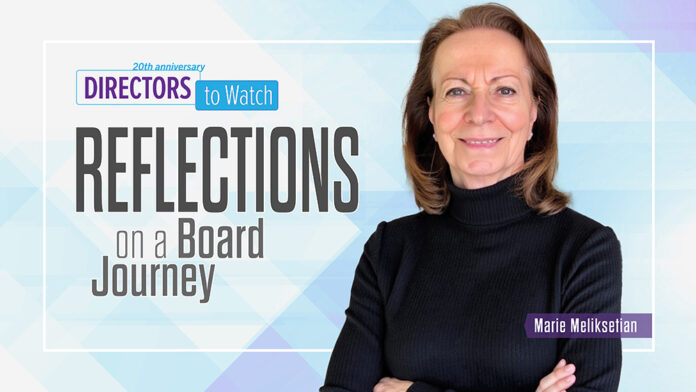This piece is part of a series of observations from our past Directors to Watch, encompassing the ways board service has changed since they received the honor and what they are doing to ensure they continue to thrive as board members amid an evolving landscape.
Marie Meliksetian
Directors to Watch 2025
Enclave at Taunton Lake
Over the past year, I’ve seen how quickly the role of the board has evolved, moving from general awareness to active, hands-on oversight. Boards are no longer passive when it comes to AI, regulatory risk or organizational resilience. We are expected to ensure technology and talent strategies are future-ready, risk management evolves with geopolitical volatility and governance structures can adapt to the speed and complexity of today’s environment.
In 2024, much of the conversation was about building awareness — understanding risks, refining ESG strategies and starting discussions around AI. But 2025 has brought a new level of expectation. Boards are now focused on AI governance, navigating political and regulatory complexity, and ensuring organizational resilience, especially when it comes to technology and talent.
Several issues that once felt distant are now at the forefront. AI accountability and liability frameworks are evolving rapidly. Quantum computing is emerging as a real cyber threat, requiring early oversight. Stakeholders are demanding more than ESG reports. They expect organizations to address the social impacts of climate transitions. And technology fragmentation across regions requires innovative approaches to data governance and compliance.
Board service is an incredible privilege, but it’s also one of the most demanding forms of leadership I’ve experienced. Looking back, I would have done a few things differently to prepare for the journey. I would have been more intentional earlier, building board-relevant credentials and trusted networks. I would have invested more deeply in understanding governance fundamentals and market-shaping trends like AI and cybersecurity. I would have refined how I communicate my board value, focusing on insight, oversight and constructive challenge. Most importantly, I would have prioritized alignment, ensuring the board’s purpose, culture and expectations matched my own before saying yes.


